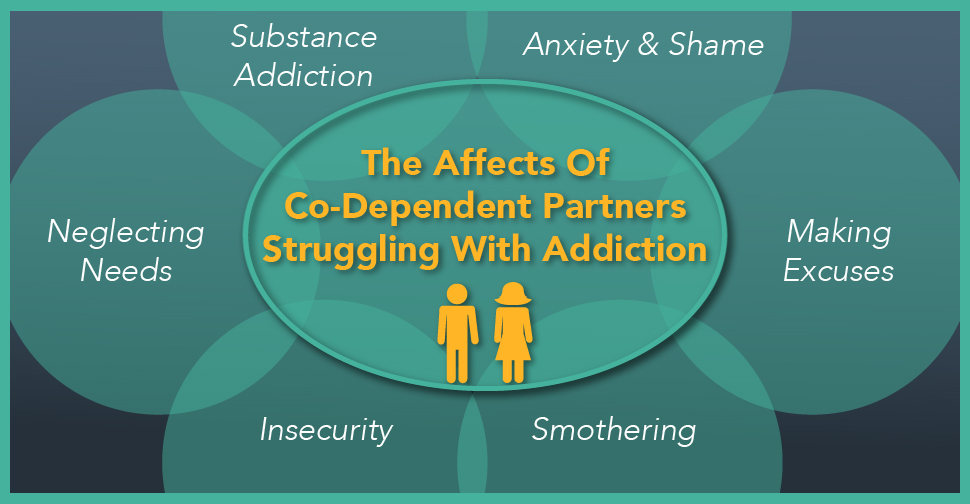
Co-dependency is, according to Mental Health America, “An emotional and behavioral condition that can affect an individual’s ability to have a healthy, satisfying relationship.” Co-dependent people often have good intentions, but can take things too far. As parents, they may smother their children, placing a child’s happiness over their own to an unhealthy degree. They can make excuses for behavior or let the child have their way in everything, all because they are afraid of losing the child’s love. In romantic relationships and marriages, the pattern of co-dependency is similar. Letting one person make all household decisions, putting oneself aside in order to focus exclusively on the dominant spouse, and defending the behavior of the dominant person to anyone who questions it are all symptoms of co-dependency.
Co-Dependency And Addiction
When addiction enters the picture, co-dependency becomes at once, worse and more significant. The co-dependent becomes an addict of sorts as well, often obsessing about the behavior of the addict.
Say there’s a couple, Spouse A and Spouse B. Spouse A is struggling with addiction, but in denial about the situation. Spouse B, seeing the household and family situation deteriorating because of this, decides to step in. The kids are taken care of, the home is kept up, and few in the outside world are any wiser because Spouse B does such a good job. While Spouse A spirals more out of control, Spouse B ups the game even more, taking on extra responsibilities whenever needed. In time, Spouse B’s entire life revolves around the addiction of Spouse A, as much as A’s does.
Feelings Of Shame
Among co-dependents, feelings of shame are very common. They may not want anyone knowing about the addiction of those they care for, and may have addiction issues themselves, further complicating things. They often don’t acknowledge the shame and accompanying anxiety, but these feelings are very powerful, all the same. A co-dependent may think of themselves as helpless, unable to change the situation. This can lead to even lower self-esteem, and continue the cycle.
How Does This Affect Recovery?
An addict going back into a situation where someone is doing everything for them can easily slip back into bad habits. In the previous example, what motivation does Spouse A have to change if Spouse B is doing everything that needs doing? In that case, Spouse B does indeed have a relationship problem—but with themselves. A co-dependent person suffers from low self-esteem, and needs to figure themselves out before they can help anyone else. In our example, B needs to step back and let A take place in the household life again. A co-dependent person needs to recover from their situation, then focus on awareness and acceptance. Understanding the current situation is key, as is not judging it. Only after the situation is identified can action be taken—on the parts of both Spouse A and B. Once they focus on healing and re-discovering themselves, the issues of co-dependency and addiction can be addressed.
Help Is Here To Get You Out
 If you find yourself in a co-dependent relationship with an addict or are struggling with addiction yourself, contact us today. We can help you find treatment for both issues. Addiction is a complex thing, and rarely affects just one person in a situation. Let us assist you in discovering how to best care for everyone touched by addiction in your life.
If you find yourself in a co-dependent relationship with an addict or are struggling with addiction yourself, contact us today. We can help you find treatment for both issues. Addiction is a complex thing, and rarely affects just one person in a situation. Let us assist you in discovering how to best care for everyone touched by addiction in your life.
